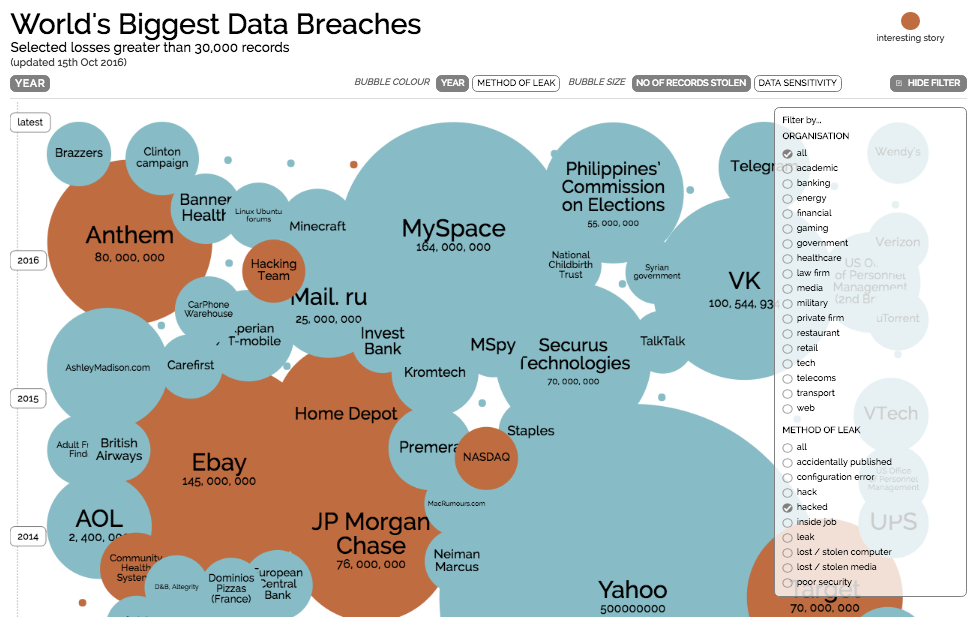Snyk - Automatically Scan and Fix Ruby and Nodejs Vulnerabilities
This is a story about a company called Snyk (pronounced “sneak”), their founder Guy Podjarny, my decision to become one of their advisors, and how they are going to help save you from malevolent agents trying to steal your digital stuff.
If you’re anything like me, you’re simultaneously terrified and in awe of the increasing commonality of large corporate security breaches. Even big names like Ebay, Home Depot, Anthem, JP Morgan Chase, Target, LinkedIn, Dropbox, and Yahoo are falling victim to sophisticated attacks. If you spend even a few minutes looking into it, you’ll be shocked at how frequently these breaches are happening now. The fine folks at Information is Beautiful have an excellent interactive visualization of the World’s Biggest Data Breaches over the last twelve years, in case you want to read all the gory details and never get a restful night of sleep ever again:
I’ve used a fair number of emotionally charged words above that might be triggering your FUD detectors right about now. But be advised: it’s not paranoia when they really are out to get you. If recent, extremely high profile (and subsequently weaponized) breaches like those of the Clinton Campaign and the DNC aren’t enough to make you want to air gap your entire life, then I envy your steely-eyed mettle and implore you to teach me your meditation techniques.
The fact is, security is hard. And it’s getting harder every day. To win, you have to get it right every single time. To lose (and lose big), you only have to screw it up once.
During my years at GitHub, I spent a lot of time assembling a dedicated security team, managing security audits and penetration tests, and working to establish a culture of security awareness amongst our development team. All of this is challenging and expensive, especially for a young company. Even worse, it’s the kind of investment that’s totally invisible when it’s working, making it hard to sustain until that crucial and terrible moment you end up on the front page of Hacker News as the latest victim.
A year ago I was contemplating this, especially the difficult proposition of having developers, furious at work on new features, constantly maintain awareness of security vulnerabilities they might be inadvertently weaving into the product. Web application developers are generally not security experts, and though I would love to live in a world where that wasn’t true, it’s just not a realistic expectation. Meanwhile, modern development means an increasing reliance on 3rd party code. Even a small Rails app will probably have 300 or more gem dependencies after a few months of development. It’s even more in the nodejs world. This level of modularization and code reuse, driven by the explosion of high quality open source over the last decade, is amazing and I absolutely love it, but it comes at a security expense.
Open source projects are not known for their excellent security records. Vulnerabilities like Heartbleed and Shellshock painfully demonstrate the idea that “given enough eyeballs, all bugs are shallow” is completely false. In fact, due to a flaw in YAML, Rails had a pretty extreme remote code execution vulnerability for years. If you were running any version of Rails prior to the fix, you were vulnerable. This stuff is real, and as responsible developers, we need to be more proactive about it.
Luckily, at the time I was pondering these matters, I ran into Guy Podjarny. As a former cofounder of Blaze.io and then CTO of Web Experience at Akamai (which acquired Blaze.io), Guy intimately understands the impact of security on today’s web developers. He was working on an automated tool to scan and fix security vulnerabilities in 3rd party dependencies. I was intrigued. They already had a way to scan nodejs projects and look for known security vulnerabilities in the dependency tree and automatically upgrade or patch affected libraries. I thought this was pretty cool, but it was his vision for what automated security tooling could be that sold me on him and his company. I can’t talk much about that now, but just know that what Snyk is today is just the tip of what will become an intelligent and proactive bodyguard for your entire codebase.
A few months ago, Snyk released GitHub integration to make it fantastically simple to hook up your repos to Snyk and, my favorite feature: the ability to monitor your repo for future vulnerabilities and then automatically submit a pull request with the suggested package upgrade or hotfix patch (nodejs only for now).
Today, Snyk announced support for Ruby. Take a look at that blog post, it does an awesome job of explaining how simple it is to set up and what the generated pull requests look like. It’s totally free for open source projects, and extremely cheap insurance for your important projects.
Make no mistake, 3rd party code is a clear and present danger to your business. If you don’t know if you’re vulnerable, then you must assume that you are and take steps to protect yourself. Snyk makes it easy.

